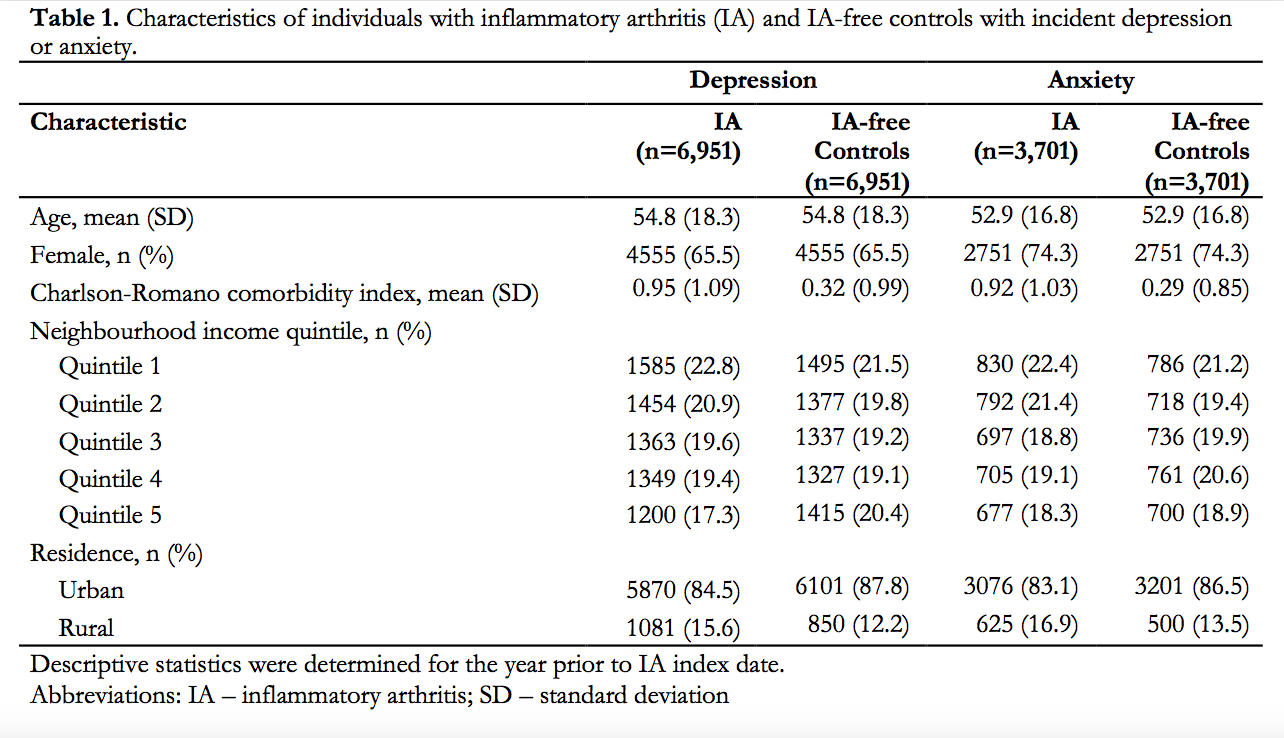Session Information
Session Type: Poster Session C
Session Time: 9:00AM-11:00AM
Background/Purpose: To describe patterns of pharmacological and psychological treatment and evaluate the receipt of minimally adequate treatment for incident depression and anxiety in individuals with inflammatory arthritis (IA), specifically ankylosing spondylitis (AS), psoriatic arthritis (PsA), and rheumatoid arthritis (RA).
Methods: Our cohort study used population-based linked administrative health databases from Population Data BC to identify individuals (≥18 years)with IA and IA-free controls matched on age, sex, and incident depression or anxiety. We assessed mental health treatment in the first year following incident depression or anxiety and pharmacological treatments were identified using Anatomical Therapeutic Chemical codes for antidepressants and anxiolytics. Psychological treatments were identified using fee-item codes that included publicly funded counselling, psychotherapy, and psychiatrist visits. We defined minimally adequate pharmacological treatment as antidepressant prescriptions filled with ≥84 days of supply. We defined minimally adequate psychological treatment as the receipt of ≥4 counselling/psychotherapy services. Multivariable logistic regression models, adjusted for age, sex, comorbidities, income, and residence, were used to evaluate the odds of individuals with IA receiving minimally adequate pharmacological or psychological care for their incident depression or anxiety as compared to IA-free controls.
Results: Cases of incident depression were identified in 6,951 individuals with IA (mean age 54.8 ± 18.3 years, 65.5% female) and 6,951 IA-free controls (mean age 54.8 ± 18.3 years, 65.5% female). Incident anxiety was identified among 3,701 with IA (mean age 52.9 ± 16.8 years, 74.3% female) and 3,701 IA-free controls (mean age 52.9 ± 16.8 years, 74.3% female) (Table 1). More than half of the IA and control study sample with depression had ≥1 antidepressant prescription filled (IA 64.3%; controls 61.4%). Fewer individuals with IA and comorbid anxiety had ≥1 antidepressant (IA 58.5%, controls 54.2%) or ≥1 anxiolytic (IA 46.8%, controls 40.1%) prescription dispensed. The receipt of minimally adequate pharmacological and psychological treatment for depression was observed in 50.5% and 19.6% of those with IA, respectively, with no significant difference compared to controls (pharmacological: adjusted odds ratio [aOR] 1.01, 95% confidence interval [CI] 0.90 to 1.13; psychological: aOR 0.96, 95% CI 0.88 to 1.05). The proportion receiving minimally adequate pharmacological (IA 46.9%, controls 44.1%) and psychological (IA 20.2%, controls 19.0%) treatment for anxiety was also similar between individuals with IA and controls (pharmacological: aOR 0.91, 95% CI 0.77 to 1.08; psychological: aOR 1.04, 95% CI 0.92 to 1.18).
Conclusion: A large proportion of individuals with depression or anxiety were not receiving adequate care by means of medications and publicly funded mental health services, regardless of a comorbid IA diagnosis. Exploring methods for rheumatology to facilitate greater access to mental health care is imperative given the increased prevalence and negative impacts of depression and anxiety in this patient population.
To cite this abstract in AMA style:
Howren A, Sayre E, Avina-Zubieta J, Puyat J, Da Costa D, Xie H, Gupta A, De Vera M. Evaluation of the Receipt of Adequate Pharmacological and Psychological Treatment for Incident Depression and Anxiety in Individuals Living with Inflammatory Arthritis [abstract]. Arthritis Rheumatol. 2023; 75 (suppl 9). https://acrabstracts.org/abstract/evaluation-of-the-receipt-of-adequate-pharmacological-and-psychological-treatment-for-incident-depression-and-anxiety-in-individuals-living-with-inflammatory-arthritis/. Accessed .« Back to ACR Convergence 2023
ACR Meeting Abstracts - https://acrabstracts.org/abstract/evaluation-of-the-receipt-of-adequate-pharmacological-and-psychological-treatment-for-incident-depression-and-anxiety-in-individuals-living-with-inflammatory-arthritis/

